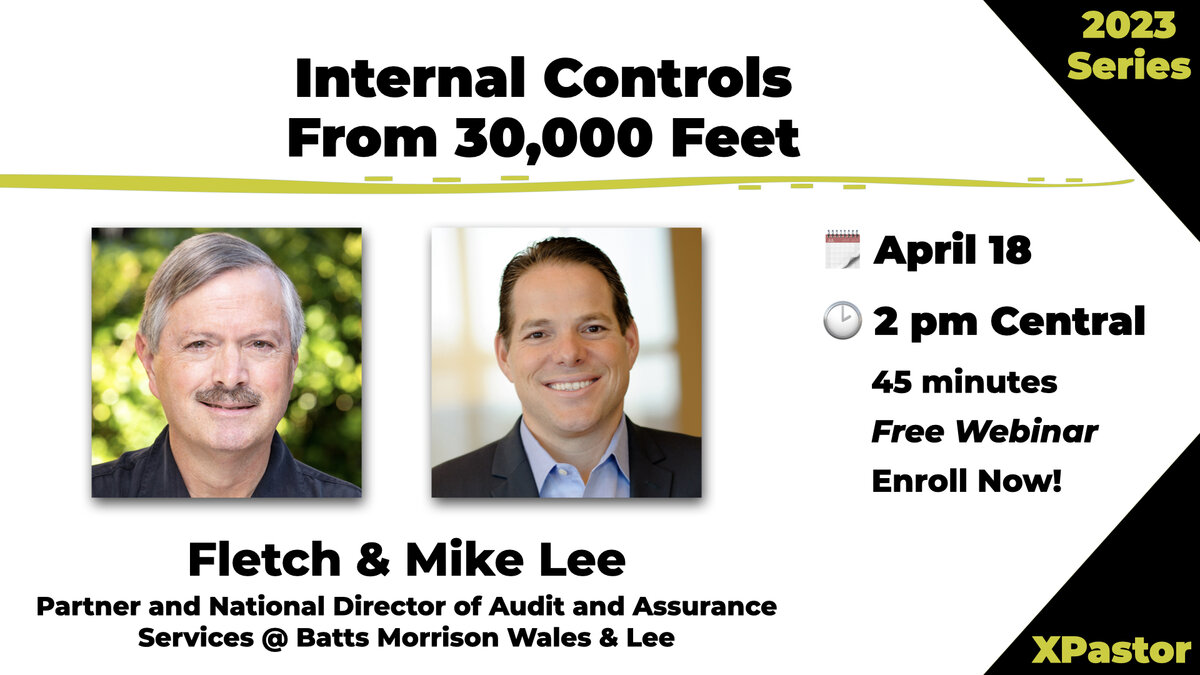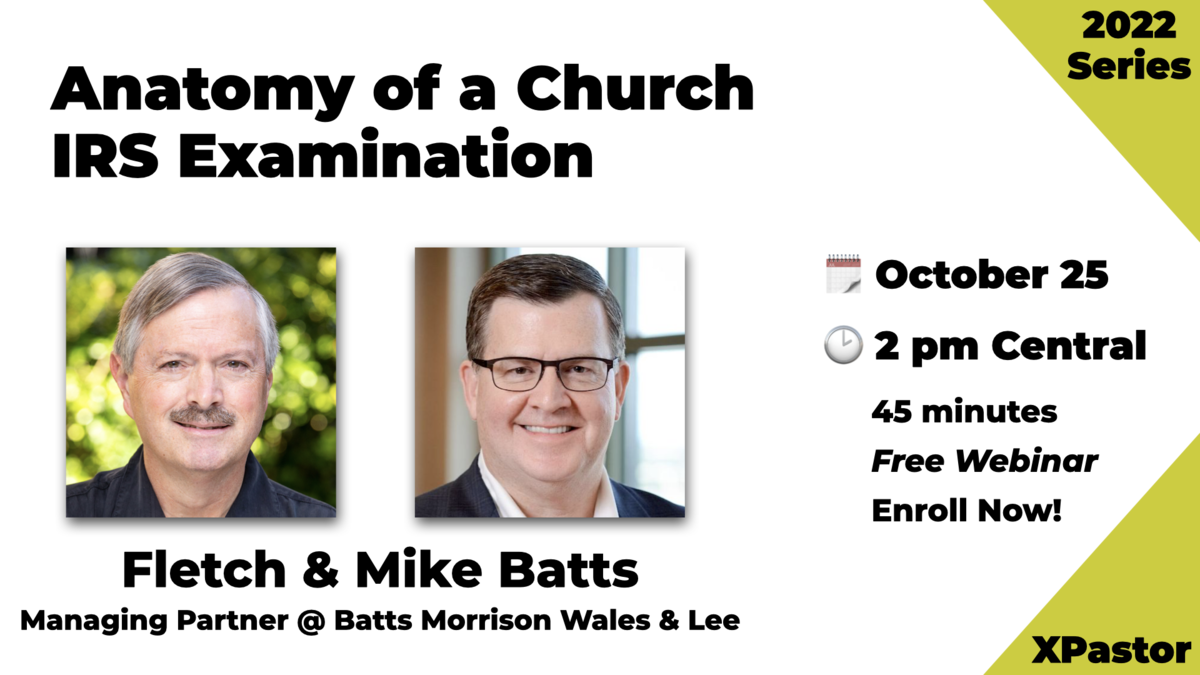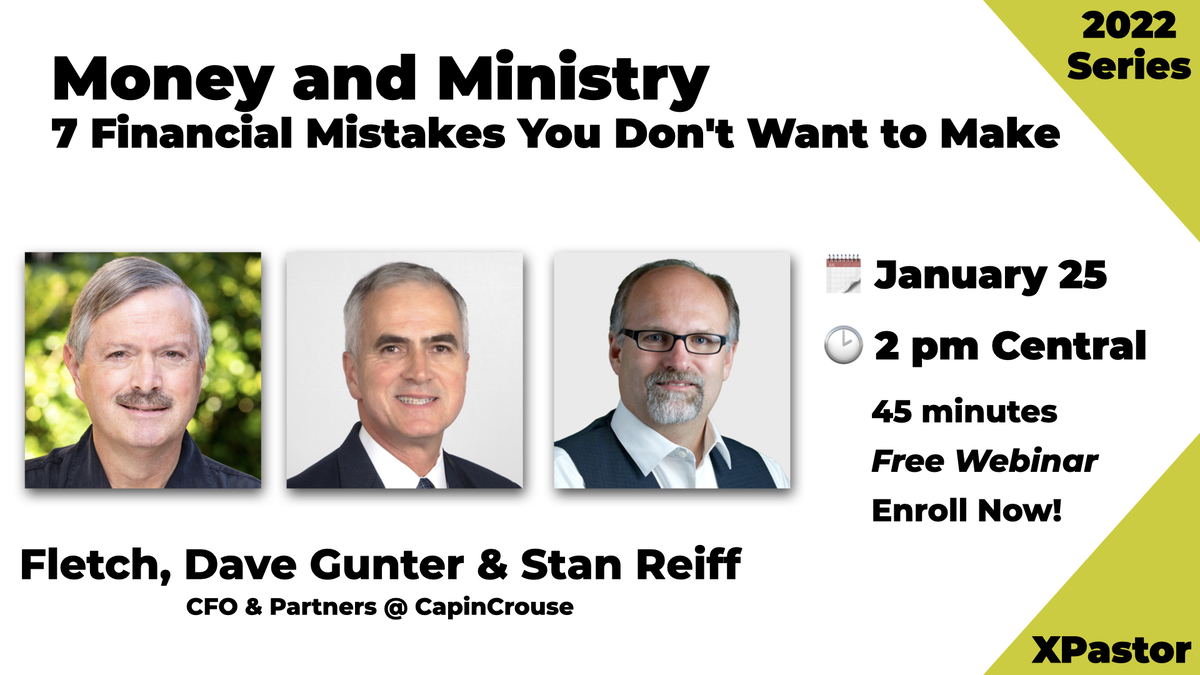Churches desiring to employ an audit or other accountability measure with respect to their financial operations may opt for various approaches, depending on their size, scope, and complexity. Audits and other financial accountability activities are conducted either by parties who are external or internal to the church. Smaller churches tend to utilize internal accountability processes that are typically performed by members of the church’s governing body, by its finance committee or equivalent, or by volunteer supporters of the church. In smaller churches, the procedures tend to be less formal. Larger churches find it more difficult for board members, committee members, or volunteers to adequately perform all of the internal accountability functions needed. Accordingly, larger churches, often those with annual revenues exceeding $3 million, commonly engage external auditors.
External Audits and Other CPA-Performed Engagements
Churches have external audits or other accountability-oriented services performed by certified public accounting firms for a variety of reasons. Sometimes, a lending institution requires a church to have an external audit of its financial statements as a condition of making a loan to the church. Some churches may be required by their denomination or association to have an audit. These and other externally-imposed requirements for a church to have an external audit do not, however, represent the highest and best reasons for an external audit. The highest and best reason for a church to have an external audit is to facilitate the church’s financial integrity and accountability and to increase the likelihood that significant internal control deficiencies, tax compliance vulnerabilities, or similar matters will come to the attention of the church’s leadership before they become real problems for the church.
Certified Public Accountants (CPAs) and CPA firms are uniquely licensed as a matter of state law throughout the United States to perform audits and provide certain other services with respect to a church’s financial statements. It is a violation of state law for anyone other than a CPA or a CPA firm to hold himself, herself, or itself out as providing audit, assurance, or attestation services with respect to an organization’s financial statements. Churches should be careful when seeking an external audit to ensure that the person or firm being engaged is licensed or legally authorized to practice as a CPA or CPA firm. Some non-CPA individuals and companies hold themselves out in a manner that implies that they perform external audits or similar services. Churches should avoid such practitioners.
The highest quality external audits for churches are those provided by independent CPA firms with extensive and reputable experience serving churches. Firms with such experience should be able to help the church proactively identify issues that warrant attention that are common to the church and the nonprofit sector.
In addition to independent external audits, CPA firms offer other levels of service with respect to a church’s financial statements and/or operating activities. Following is a brief description of the primary levels of engagement available from CPA firms, along with commentary regarding the relative value and usefulness of each.
Audits
An audit is the highest level of assurance a CPA firm can provide with respect to a church’s financial statements. Audited financial statements provide the church’s governing body with the auditor’s opinion as to whether the financial statements are presented fairly, in all material respects, in conformity with the method of accounting utilized. The opinion offers reasonable, but not absolute, assurance with respect to the financial statements to which it applies.
In an audit, the CPA firm should obtain an understanding of the church’s internal control and assess fraud risk as it relates to the financial statements. The firm should also corroborate the amounts and disclosures included in the financial statements by obtaining audit evidence through inquiry, physical inspection, observation, third-party confirmations, examination, analytical procedures, and other procedures. A properly performed audit should result in the following reports, at a minimum:
- An opinion on the financial statements;
- Financial statements and related disclosures;
- A report addressing any material weaknesses or significant deficiencies in internal control identified by the CPA firm in performing the engagement; and
- A report to those charged with governance oversight of the church regarding certain matters related to the audit process itself—e.g., independence of the auditors, sensitive items in the financial statements, difficulties in performing the engagement, etc.
Commentary
A well-performed audit conducted by a CPA firm with extensive, reputable experience serving churches should yield significant value to a church and its leaders. An audit results in an opinion on the financial statements by the CPA, providing reasonable assurance that the financial statements are fairly stated—assuming the audit testwork supports such a conclusion. No other level of engagement provides a comparable level of assurance regarding the church’s financial statements.
Additionally, in an audit, the CPA is required to obtain an understanding of the church’s internal control and assess the risk of material misstatements, including the risk of fraud, in the financial statements to the extent necessary to perform the audit. In the event that the auditor identifies fraud, material weaknesses, or significant deficiencies in the church’s internal control, the auditor is required to report such matters to the church’s leadership. The auditor’s report addressing internal control can be one of the most valuable products of the independent external audit process. A well-performed audit that identifies weaknesses in a church’s internal controls can help the church improve its systems, processes, and protocols to reduce the risk of improprieties and financial misstatements in the future.
Finally, if the CPA firm performing the audit has extensive experience addressing tax and operational matters for churches, the CPA firm may utilize the audit process to identify other vulnerabilities, such as tax compliance risks, or opportunities, such as tax exemptions not fully utilized by the church. When a firm provides such value-added commentary to a church for which it is performing an audit, the overall value received by the church in an audit process is enhanced further.
While an independent external audit provides the most value to the church of all of the types of engagements a CPA firm may provide, an audit is also typically the most costly type of engagement. Accordingly, churches considering having an independent external audit must weigh the value of the services to be received with the overall cost. For this reason, it is more common for larger churches, typically those with annual revenues of $3 million or more, to have independent external audits than it is for smaller ones to do so.
Reviews and Compilations
A church can also have an external CPA firm perform lower-level engagements involving their financial statements. An external CPA can perform a review or a compilation of financial statements. Since neither a review nor a compilation involves an opinion on the financial statements or obtaining an understanding of internal controls, these engagements have limited value for church leaders and are not described further in this article. More information about reviews and compilations is available in the author’s book Church Finance, published by Christianity Today and available on Amazon and ChurchLawandTax.
Advisory Services
A church may also consider engaging a firm to provide advisory services with respect to certain aspects of its financial operations. Advisory services provided by CPA firms may take many forms, but they generally involve a formal agreement to provide informal advice to the church with respect to a particular area of the church’s financial operations. Examples of areas for which the church may wish to engage a CPA firm to provide advisory services include, but are not limited to, the following:
- Internal control matters;
- Tax compliance matters;
- Accounting treatment for certain transaction types;
- Business-oriented commentary on proposed transactions;
- Risk management; and
- Board governance.
Special Engagements
CPA firms can sometimes create or tailor a special engagement to meet the needs of a particular church. For example, smaller churches have unique needs that may warrant professional expertise, but they may not be in a position to have a full audit performed. Churches with such needs should consult with a CPA firm about the options available.
As an example, the author’s firm, Batts Morrison Wales & Lee (BMWL), offers a specific type of advisory services engagement designed for smaller churches. The Financial Foundations Engagement™ offered by BMWL is particularly suited for churches that want to address the foundational elements of financial management and oversight but are not ready to have a full audit of their financial statements. The cost of a Financial Foundations Engagement™ is less than that of an audit, and it includes advisory services in the key areas of effective financial oversight, internal control, and tax compliance for churches. Other CPA firms may offer other special-purpose advisory services engagements.
Internal Audits
Internal audits and similar activities may be conducted in a variety of ways. In some cases, a church’s board members or finance committee members, or equivalent, perform the tasks. In other cases, volunteer supporters of the church perform the duties. In larger settings, the church may contract with an individual or a firm to perform procedures.
The purposes of internal audits often vary significantly from the purpose of an external audit. As noted above, external audits are primarily focused on addressing the reliability of the church’s financial statements. Internal audits, however, may be designed to address either financial or operational matters. For example, an internal audit may be performed to assess a church’s compliance with its own operational policies in areas such as internal control, human resources, child safety, transportation safety, or other areas of significant interest and potential risk to the church.
Attributes of a Quality Internal Audit Process
Regardless of who leads and carries out an internal audit process for a church, certain attributes should exist with respect to any internal audit activity in order for the activity to be useful and credible:
- An internal audit process should be overseen by a person or group—the oversight body, that is independent with respect to the issues being addressed.
- The internal auditor, the person or group performing the internal audit procedures and issuing the related reports, should also be independent with respect to the issues being addressed.
- The internal auditor should report directly to the oversight body and not to the church’s management. While the internal auditor will certainly interact with the church’s management and employees in performing audit procedures, the internal auditor must issue and present reports directly to the oversight body in order for an internal audit process to maintain credibility. Practical note—if an internal auditor is an employee of the church, he or she is subject to the church’s applicable employment and other policies, e.g., payroll matters, employee benefits matters, etc. With respect to such matters, an employee-internal auditor is subject to the authority of the church’s management, so long as management’s oversight does not interfere with or impede the objectivity of the internal auditor’s work and reporting responsibilities.
- The oversight body should establish and formally approve specific objectives of the internal audit process, the methodologies to be used, and the timing and nature of the reports to be issued.
- The internal auditor should conduct the internal audit procedures and prepare the related reports pursuant to the objectives and methodologies approved by the oversight body described in the preceding sentence.
The internal auditor’s reports should provide an objective description of findings. The quality and credibility of an internal auditor’s reports can be severely compromised when the internal auditor’s report goes beyond reporting objective findings to drawing personal conclusions or making subjective statements of opinion regarding the matters subject to the audit. For example, if an internal auditor were to note in his/her report that the auditor observed certain children’s classrooms being supervised by only one adult, in violation of the church’s two-adult protocol, reporting such a finding in and of itself would be objective. If the internal auditor were to add a subjective statement such as, “These violations jeopardized the safety of our church’s children,” or “The teachers responsible for these violations should be disciplined,” the credibility and objectivity of the internal auditor’s report would be compromised. Further, such statements could increase the church’s legal risks.
Internal Financial Audit Checklist for Small Churches
BMWL has created a basic internal financial audit checklist as a resource for small churches with simple financial structures and operations. To access the Internal Financial Audit Checklist for Small Churches, click here.
Conclusion
Churches can address audits and other accountability measures using a variety of approaches. The approach taken by each church should take into consideration the church’s size, scope, and complexity. Most importantly, for any accountability measure to have real value, it must be carried out by appropriate people with a commitment to excellence in the process.










